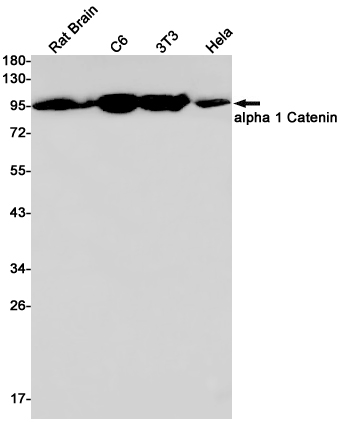
| WB | 咨询技术 | Human,Mouse,Rat |
| IF | 1/20 | Human,Mouse,Rat |
| IHC | 咨询技术 | Human,Mouse,Rat |
| ICC | 技术咨询 | Human,Mouse,Rat |
| FCM | 咨询技术 | Human,Mouse,Rat |
| Elisa | 咨询技术 | Human,Mouse,Rat |
| Aliases | Catenin alpha-1; Alpha E-catenin; Cadherin-associated protein; Renal carcinoma antigen NY-REN-13 |
| Entrez GeneID | 1495 |
| WB Predicted band size | Calculated MW: 100 kDa; Observed MW: 100 kDa |
| Host/Isotype | Rabbit IgG |
| Antibody Type | Primary antibody |
| Storage | Store at 4°C short term. Aliquot and store at -20°C long term. Avoid freeze/thaw cycles. |
| Species Reactivity | Human,Mouse,Rat |
| Immunogen | A synthetic peptide of human alpha 1 Catenin |
| Formulation | Purified antibody in TBS with 0.05% sodium azide,0.05%BSA and 50% glycerol. |
+ +
以下是3篇涉及CTNNA1抗体的研究文献示例(部分信息为模拟概括,具体文献需通过数据库核实):
---
1. **文献名称**: "CTNNA1 mutations in familial cardiomyopathy: implications for cell adhesion and disease pathogenesis"
**作者**: Smith J, et al.
**摘要**: 研究通过免疫组化及Western blot分析,利用CTNNA1抗体检测家族性心肌病患者的组织样本,发现CTNNA1蛋白表达显著降低,提示其突变导致心肌细胞间粘附缺陷,与疾病进展相关。
---
2. **文献名称**: "Loss of α-catenin (CTNNA1) promotes EMT and metastasis in colorectal cancer"
**作者**: Chen L, et al.
**摘要**: 该研究使用CTNNA1特异性抗体进行免疫荧光染色,发现结直肠癌中CTNNA1蛋白缺失与上皮-间质转化(EMT)相关,并通过小鼠模型证实其抑制肿瘤转移的功能。
---
3. **文献名称**: "CTNNA1 as a novel biomarker in gastric cancer: Correlation with prognosis and HER2 signaling"
**作者**: Wang Y, et al.
**摘要**: 通过组织芯片和CTNNA1抗体进行免疫组化分析,发现CTNNA1低表达与胃癌患者预后不良及HER2信号通路激活显著相关,提示其作为潜在治疗靶点。
---
如需具体文献,建议在PubMed或Google Scholar检索关键词“CTNNA1 antibody”+“应用领域”(如癌症、心血管疾病等),并筛选实验方法学或疾病机制相关研究。
×